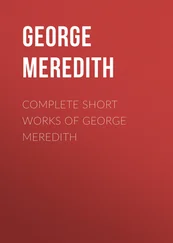George Meredith - Rhoda Fleming. Complete
Здесь есть возможность читать онлайн «George Meredith - Rhoda Fleming. Complete» — ознакомительный отрывок электронной книги совершенно бесплатно, а после прочтения отрывка купить полную версию. В некоторых случаях можно слушать аудио, скачать через торрент в формате fb2 и присутствует краткое содержание. Жанр: foreign_prose, literature_19, foreign_antique, на английском языке. Описание произведения, (предисловие) а так же отзывы посетителей доступны на портале библиотеки ЛибКат.
- Название:Rhoda Fleming. Complete
- Автор:
- Жанр:
- Год:неизвестен
- ISBN:нет данных
- Рейтинг книги:3 / 5. Голосов: 1
-
Избранное:Добавить в избранное
- Отзывы:
-
Ваша оценка:
- 60
- 1
- 2
- 3
- 4
- 5
Rhoda Fleming. Complete: краткое содержание, описание и аннотация
Предлагаем к чтению аннотацию, описание, краткое содержание или предисловие (зависит от того, что написал сам автор книги «Rhoda Fleming. Complete»). Если вы не нашли необходимую информацию о книге — напишите в комментариях, мы постараемся отыскать её.
Rhoda Fleming. Complete — читать онлайн ознакомительный отрывок
Ниже представлен текст книги, разбитый по страницам. Система сохранения места последней прочитанной страницы, позволяет с удобством читать онлайн бесплатно книгу «Rhoda Fleming. Complete», без необходимости каждый раз заново искать на чём Вы остановились. Поставьте закладку, и сможете в любой момент перейти на страницу, на которой закончили чтение.
Интервал:
Закладка:
“I should think you did!” said the farmer, winking slyly.
Anthony caught the smile, hesitated and looked shrewd, and then covered his confusion by holding his plate to Mrs. Sumfit for a help. The manifest evasion and mute declaration that dumpling said “mum” on that head, gave the farmer a quiet glow.
“When you are ready to tell me all about my darlin’, sir,” Mrs. Sumfit suggested, coaxingly.
“After dinner, mother—after dinner,” said the farmer.
“And we’re waitin’, are we, till them dumplings is finished?” she exclaimed, piteously, with a glance at Master Gammon’s plate.
“After dinner we’ll have a talk, mother.”
Mrs. Sumfit feared from this delay that there was queer news to be told of Dahlia’s temper; but she longed for the narrative no whit the less, and again cast a sad eye on the leisurely proceedings of Master Gammon. The veteran was still calmly tightening. His fork was on end, with a vast mouthful impaled on the prongs. Master Gammon, a thoughtful eater, was always last at the meal, and a latent, deep-lying irritation at Mrs. Sumfit for her fidgetiness, day after day, toward the finish of the dish, added a relish to his engulfing of the monstrous morsel. He looked at her steadily, like an ox of the fields, and consumed it, and then holding his plate out, in a remorseless way, said, “You make ‘em so good, marm.”
Mrs. Sumfit, fretted as she was, was not impervious to the sound sense of the remark, as well as to the compliment.
“I don’t want to hurry you, Mas’ Gammon,” she said; “Lord knows, I like to see you and everybody eat his full and be thankful; but, all about my Dahly waitin’,—I feel pricked wi’ a pin all over, I do; and there’s my blessed in London,” she answered, “and we knowin’ nothin’ of her, and one close by to tell me! I never did feel what slow things dumplin’s was, afore now!”
The kettle simmered gently on the hob. Every other knife and fork was silent; so was every tongue. Master Gammon ate and the kettle hummed. Twice Mrs. Sumfit sounded a despairing, “Oh, deary me!” but it was useless. No human power had ever yet driven Master Gammon to a demonstration of haste or to any acceleration of the pace he had chosen for himself. At last, she was not to be restrained from crying out, almost tearfully,—
“When do you think you’ll have done, Mas’ Gammon?”
Thus pointedly addressed, Master Gammon laid down his knife and fork. He half raised his ponderous, curtaining eyelids, and replied,—
“When I feels my buttons, marm.”
After which he deliberately fell to work again.
Mrs. Sumfit dropped back in her chair as from a blow.
But even dumplings, though they resist so doggedly for a space, do ultimately submit to the majestic march of Time, and move. Master Gammon cleared his plate. There stood in the dish still half a dumpling. The farmer and Rhoda, deeming that there had been a show of inhospitality, pressed him to make away with this forlorn remainder.
The vindictive old man, who was as tight as dumpling and buttons could make him, refused it in a drooping tone, and went forth, looking at none. Mrs. Sumfit turned to all parties, and begged them to say what more, to please Master Gammon, she could have done? When Anthony was ready to speak of her Dahlia, she obtruded this question in utter dolefulness. Robert was kindly asked by the farmer to take a pipe among them. Rhoda put a chair for him, but he thanked them both, and said he could not neglect some work to be done in the fields. She thought that he feared pain from hearing Dahlia’s name, and followed him with her eyes commiseratingly.
“Does that young fellow attend to business?” said Anthony.
The farmer praised Robert as a rare hand, but one affected with bees in his nightcap,—who had ideas of his own about farming, and was obstinate with them; “pays you due respect, but’s got a notion as how his way of thinking’s better ‘n his seniors. It’s the style now with all young folks. Makes a butt of old Mas’ Gammon; laughs at the old man. It ain’t respectful t’ age, I say. Gammon don’t understand nothing about new feeds for sheep, and dam nonsense about growing such things as melons, fiddle-faddle, for ‘em. Robert’s a beginner. What he knows, I taught the young fellow. Then, my question is, where’s his ideas come from, if they’re contrary to mine? If they’re contrary to mine, they’re contrary to my teaching. Well, then, what are they worth? He can’t see that. He’s a good one at work—I’ll say so much for him.”
Old Anthony gave Rhoda a pat on the shoulder.
CHAPTER III
“Pipes in the middle of the day’s regular revelry,” ejaculated Anthony, whose way of holding the curved pipe-stem displayed a mind bent on reckless enjoyment, and said as much as a label issuing from his mouth, like a figure in a comic woodcut of the old style:—“that’s,” he pursued, “that’s if you haven’t got to look up at the clock every two minutes, as if the devil was after you. But, sitting here, you know, the afternoon’s a long evening; nobody’s your master. You can on wi’ your slippers, up wi’ your legs, talk, or go for’ard, counting, twicing, and three-timesing; by George! I should take to drinking beer if I had my afternoons to myself in the city, just for the sake of sitting and doing sums in a tap-room; if it’s a big tap-room, with pew sort o’ places, and dark red curtains, a fire, and a smell of sawdust; ale, and tobacco, and a boy going by outside whistling a tune of the day. Somebody comes in. ‘Ah, there’s an idle old chap,’ he says to himself, (meaning me), and where, I should like to ask him, ‘d his head be if he sat there dividing two hundred and fifty thousand by forty-five and a half!”
The farmer nodded encouragingly. He thought it not improbable that a short operation with these numbers would give the sum in Anthony’s possession, the exact calculation of his secret hoard, and he set to work to stamp them on his brain, which rendered him absent in manner, while Mrs. Sumfit mixed liquor with hot water, and pushed at his knee, doubling in her enduring lips, and lengthening her eyes to aim a side-glance of reprehension at Anthony’s wandering loquacity.
Rhoda could bear it no more.
“Now let me hear of my sister, uncle,” she said.
“I’ll tell you what,” Anthony responded, “she hasn’t got such a pretty sort of a sweet blackbirdy voice as you’ve got.”
The girl blushed scarlet.
“Oh, she can mount them colours, too,” said Anthony.
His way of speaking of Dahlia indicated that he and she had enough of one another; but of the peculiar object of his extraordinary visit not even the farmer had received a hint. Mrs. Sumfit ventured to think aloud that his grog was not stiff enough, but he took a gulp under her eyes, and smacked his lips after it in a most convincing manner.
“Ah! that stuff wouldn’t do for me in London, half-holiday or no half-holiday,” said Anthony.
“Why not?” the farmer asked.
“I should be speculating—deep—couldn’t hold myself in: Mexicans, Peroovians, Venzeshoolians, Spaniards, at ‘em I should go. I see bonds in all sorts of colours, Spaniards in black and white, Peruvians—orange, Mexicans—red as the British army. Well, it’s just my whim. If I like red, I go at red. I ain’t a bit of reason. What’s more, I never speculate.”
“Why, that’s safest, brother Tony,” said the farmer.
“And safe’s my game—always was, always will be! Do you think”—Anthony sucked his grog to the sugar-dregs, till the spoon settled on his nose—“do you think I should hold the position I do hold, be trusted as I am trusted? Ah! you don’t know much about that. Should I have money placed in my hands, do you think—and it’s thousands at a time, gold, and notes, and cheques—if I was a risky chap? I’m known to be thoroughly respectable. Five and forty years I’ve been in Boyne’s Bank, and thank ye, ma’am, grog don’t do no harm down here. And I will take another glass. ‘When the heart of a man!’—but I’m no singer.”
Читать дальшеИнтервал:
Закладка:
Похожие книги на «Rhoda Fleming. Complete»
Представляем Вашему вниманию похожие книги на «Rhoda Fleming. Complete» списком для выбора. Мы отобрали схожую по названию и смыслу литературу в надежде предоставить читателям больше вариантов отыскать новые, интересные, ещё непрочитанные произведения.
Обсуждение, отзывы о книге «Rhoda Fleming. Complete» и просто собственные мнения читателей. Оставьте ваши комментарии, напишите, что Вы думаете о произведении, его смысле или главных героях. Укажите что конкретно понравилось, а что нет, и почему Вы так считаете.












